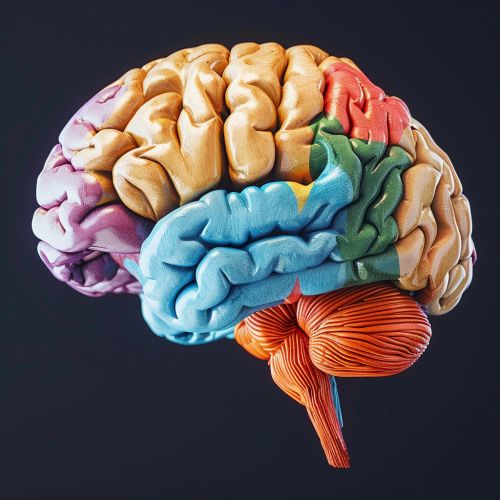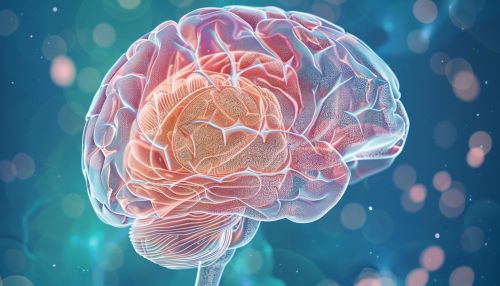Cognitive function
Introduction
Cognitive function refers to a range of mental processes that include the ability to learn new information, remember and recall information, solve problems, pay attention, and use language. These functions are essential for everyday activities and are influenced by a variety of factors including genetics, environment, and lifestyle. Cognitive functions are often divided into different domains such as memory, attention, executive function, and language.
Domains of Cognitive Function
Memory
Memory is the process by which information is encoded, stored, and retrieved. It is typically divided into three main types: sensory memory, short-term memory, and long-term memory. Sensory memory captures information from the environment through the senses and holds it for a very brief period. Short-term memory, also known as working memory, holds information temporarily for processing. Long-term memory stores information for extended periods and is further divided into explicit (declarative) memory and implicit (non-declarative) memory. Explicit memory includes episodic memory (personal experiences) and semantic memory (facts and knowledge). Implicit memory includes procedural memory (skills and tasks).
Attention
Attention is the cognitive process of selectively concentrating on one aspect of the environment while ignoring others. It involves several components including sustained attention, selective attention, and divided attention. Sustained attention refers to the ability to maintain focus over time, while selective attention involves focusing on a specific task or stimulus while ignoring distractions. Divided attention, or multitasking, refers to the ability to process multiple sources of information simultaneously.
Executive Function
Executive function encompasses a set of cognitive processes that are necessary for the cognitive control of behavior. These include planning, problem-solving, working memory, cognitive flexibility, and inhibitory control. Executive functions are primarily associated with the prefrontal cortex of the brain and are crucial for goal-directed behavior and decision-making.
Language
Language is a complex cognitive function that involves the ability to understand and produce spoken and written language. It includes several subcomponents such as phonology (sound system), morphology (word formation), syntax (sentence structure), semantics (meaning), and pragmatics (use of language in context). Language processing involves multiple areas of the brain including Broca's area and Wernicke's area.


Factors Influencing Cognitive Function
Genetics
Genetic factors play a significant role in cognitive function. Twin and family studies have shown that cognitive abilities are heritable to a considerable extent. Specific genes have been identified that are associated with cognitive abilities, including those involved in neurotransmitter systems, brain development, and synaptic plasticity.
Environment
Environmental factors such as education, socioeconomic status, and early life experiences can significantly influence cognitive function. Enriched environments that provide cognitive stimulation and opportunities for learning are associated with better cognitive outcomes. Conversely, adverse environments, such as those with high levels of stress or poor nutrition, can negatively impact cognitive development.
Lifestyle
Lifestyle factors including diet, physical activity, sleep, and social engagement also affect cognitive function. A healthy diet rich in antioxidants, omega-3 fatty acids, and other nutrients supports brain health. Regular physical activity has been shown to improve cognitive function and reduce the risk of cognitive decline. Adequate sleep is essential for cognitive processes such as memory consolidation. Social engagement and mental stimulation through activities such as reading, playing musical instruments, and engaging in hobbies can also enhance cognitive function.
Cognitive Decline and Disorders
Aging
Normal aging is associated with some degree of cognitive decline, particularly in areas such as processing speed, working memory, and executive function. However, not all cognitive functions decline with age; for example, vocabulary and general knowledge often remain stable or even improve.
Neurodegenerative Diseases
Neurodegenerative diseases such as Alzheimer's disease, Parkinson's disease, and Huntington's disease are characterized by progressive cognitive decline. Alzheimer's disease is the most common cause of dementia and is associated with the accumulation of amyloid plaques and neurofibrillary tangles in the brain. Parkinson's disease primarily affects motor function but can also lead to cognitive impairments. Huntington's disease is a genetic disorder that causes the progressive breakdown of nerve cells in the brain, leading to cognitive and motor dysfunction.
Mental Health Disorders
Mental health disorders such as depression, anxiety, and schizophrenia can also impact cognitive function. Depression is often associated with difficulties in concentration, memory, and decision-making. Anxiety can interfere with attention and working memory. Schizophrenia is characterized by impairments in executive function, working memory, and attention.
Assessment of Cognitive Function
Cognitive function is typically assessed using a variety of neuropsychological tests that measure different cognitive domains. Commonly used tests include the Mini-Mental State Examination (MMSE), the Montreal Cognitive Assessment (MoCA), and the Wechsler Adult Intelligence Scale (WAIS). These tests can help identify cognitive impairments and guide diagnosis and treatment.
Interventions and Treatments
Interventions to improve or maintain cognitive function include cognitive training, pharmacological treatments, and lifestyle modifications. Cognitive training involves structured activities designed to enhance specific cognitive skills. Pharmacological treatments for cognitive decline include medications such as cholinesterase inhibitors and memantine, which are used to treat Alzheimer's disease. Lifestyle modifications such as a healthy diet, regular physical activity, and social engagement can also support cognitive health.
